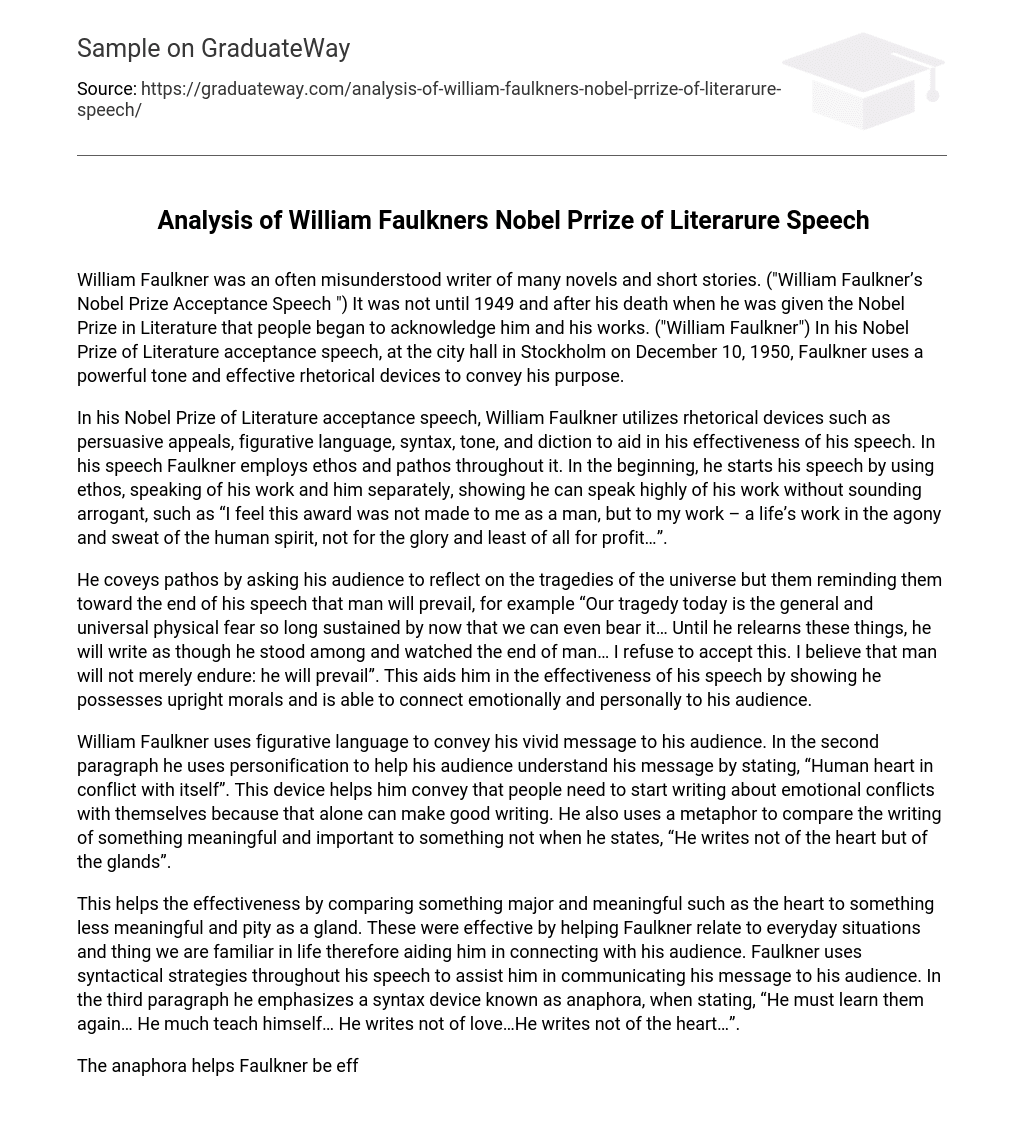William Faulkner was an often misunderstood writer of many novels and short stories. (“William Faulkner’s Nobel Prize Acceptance Speech “) It was not until 1949 and after his death when he was given the Nobel Prize in Literature that people began to acknowledge him and his works. (“William Faulkner”) In his Nobel Prize of Literature acceptance speech, at the city hall in Stockholm on December 10, 1950, Faulkner uses a powerful tone and effective rhetorical devices to convey his purpose.
In his Nobel Prize of Literature acceptance speech, William Faulkner utilizes rhetorical devices such as persuasive appeals, figurative language, syntax, tone, and diction to aid in his effectiveness of his speech. In his speech Faulkner employs ethos and pathos throughout it. In the beginning, he starts his speech by using ethos, speaking of his work and him separately, showing he can speak highly of his work without sounding arrogant, such as “I feel this award was not made to me as a man, but to my work – a life’s work in the agony and sweat of the human spirit, not for the glory and least of all for profit…”.
He coveys pathos by asking his audience to reflect on the tragedies of the universe but them reminding them toward the end of his speech that man will prevail, for example “Our tragedy today is the general and universal physical fear so long sustained by now that we can even bear it… Until he relearns these things, he will write as though he stood among and watched the end of man… I refuse to accept this. I believe that man will not merely endure: he will prevail”. This aids him in the effectiveness of his speech by showing he possesses upright morals and is able to connect emotionally and personally to his audience.
William Faulkner uses figurative language to convey his vivid message to his audience. In the second paragraph he uses personification to help his audience understand his message by stating, “Human heart in conflict with itself”. This device helps him convey that people need to start writing about emotional conflicts with themselves because that alone can make good writing. He also uses a metaphor to compare the writing of something meaningful and important to something not when he states, “He writes not of the heart but of the glands”.
This helps the effectiveness by comparing something major and meaningful such as the heart to something less meaningful and pity as a gland. These were effective by helping Faulkner relate to everyday situations and thing we are familiar in life therefore aiding him in connecting with his audience. Faulkner uses syntactical strategies throughout his speech to assist him in communicating his message to his audience. In the third paragraph he emphasizes a syntax device known as anaphora, when stating, “He must learn them again… He much teach himself… He writes not of love…He writes not of the heart…”.
The anaphora helps Faulkner be effective in his argument by the repetition of words to help him get his view of things across to the audience. To also succor his effectiveness he uses polysyndeton, which is used to draw the audience’s attention therefore adding the effect of persistence and intensity to help keep his audiences attention, making his speech effective. An example of polysyndeton is when he declares “love and honor and pity and pride and compassion and sacrifice” This quote helps signify that authors need to write from their soul and hearts so their work will no longer sound mediocre but instead meaningful.
The use of syntax helps him greatly and he uses it to help the audience connect to his message through a repetition of words to help grasp their attention. Throughout his speech the author creates an assertive tone by the uses of powerful language and word usage such as “anguish”, ”travail”, and “agony”. In his speech he uses a high ratio of polysyllabic language like “commensurate” along with some informal, for example “It will not be difficult to find a dedication for the money part of it commensurate with the purpose and significance of its origin.
But I would like to do the same with the acclaim too, by using this moment as a pinnacle from which I might be listened to by the young men and women already dedicated to the same anguish and travail…” He uses much connotative to help connect with his audience on a more personal sympathetic level such as when he states words like “inexhaustible”, “doomed”, “agony”, and “anguish”. Also throughout his speech he uses concrete and abstract language interchangeably helping him make specific and general points.
An example of concrete language is when he states, “So this award is only mine in trust. ” and an example of abstract is “Our tragedy today is a general and universal physical fear so long sustained by now that we can even bear it. ” Faulkner utilizes cacophonous language also to help convey the harsh circumstances he elaborates about in his speech, such as “that of his puny inexhaustible voice”. The mixture of tone and diction helps him be effective by making his points assertive and providing a variety of word choice which he uses to grasp and keep hold of his audience’s attention.
William Faulkner was often misunderstood but became one of the best known writers. He uses his Nobel Prize of Literature acceptance speech to covey his points to his audience about how he believes great and meaningful works of literature should be written. Rhetorical devices helped contribute a great deal to his effectiveness. The rhetorical devices that contribute to the effectiveness of the speech are persuasive appeals, figurative language, syntax, tone, and diction.





